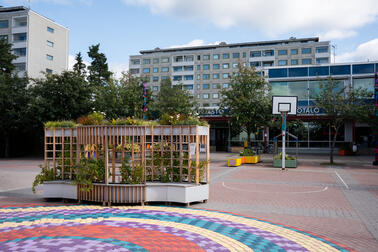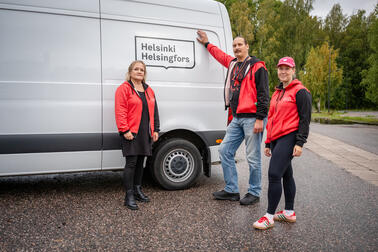
During the autumn, the City of Helsinki executives have discussed the current substance abuse situation in the city on several occasions. These discussions have led to the formulation of rapid and tangible actions to address the situation. At the same time, the City has intensified its cooperation with the Helsinki Police Department and prepared a separate memorandum on developing police cooperation.
"The increased concern among the residents of Helsinki related to the sense of safety in daily life in the city has been heard and it is clear that the recent developments in the drug situation in Helsinki require further action. As a result, we have quickly drawn up a series of concrete measures to tackle the substance abuse situation and strengthen the sense of safety of residents in Helsinki," Mayor Daniel Sazonov says.
"Each division has put together quick-acting measures that will be visible on the streets and in City services. Health care and social welfare services play an important role in this. That is why we are increasing outreach services on the streets, such as mobile substance abuse work and outreach adult social work. At the same time, the capacity for institutional detoxification and rehabilitation will be increased, as will the number of staff involved in assessing the need for institutional services," Sazonov says.
In addition to this, mental health and substance abuse nurses will increase substance abuse counselling and consultation support at health stations. Mieppi Mental Health Service Units will increase outreach activities in schools, youth centres and student welfare events.
Rapid measures to impact urban environment
"The significance of the cityscape in terms of the sense of safety among the residents of Helsinki is great. That is why we are increasing lighting maintenance rounds, identifying places where additional lighting is needed and improving the cleanliness of areas. It is our stated goal that the people of Helsinki can feel that their neighbourhoods and their streets are safe and belong to them," Sazonov says.
The City will target the rapid measures described above at key locations around Kurvi, Itäkeskus metro station, Stoa and Puotinharju shopping centre, and in the centre of Kontula.
Other rapid measures to improve the attractiveness and appeal of places for residents will also be assessed.
The safety, incident management and accessibility of indoor public spaces such as libraries and cultural centres will also be strengthened. The active use of parks and squares will be increased by communicating more actively about the possibilities for booking and renting open urban spaces.
During the autumn, the City will experiment with local caretaker (aluetalkkari) activities in a pilot area. The aim is to improve the efficiency and effectiveness of the collection of drug-related litter in the streets, parks and school and daycare playgrounds in the target area.
Training for staff and more information to parents and guardians
Rapid measures will also be targeted at schools and young people. Training on substance abuse for staff and other professional groups in schools and educational institutions will be provided. Awareness will be raised among parents and guardians by providing opportunities for discussion and information on substance abuse at parents' evenings and online information sessions.
Specialised youth clinics provide information sessions for parents on substance abuse, its impact on the development of mental health disorders and its relationship to age-appropriate development.
Cooperation with the police and other stakeholders on drug-related issues will be continued and further developed. Substance abuse education for children and young people will be promoted in close cooperation with organisations. Particular attention will be paid to preventive work with young people.
The City's communications on drugs and substance abuse will be intensified. The objective is to reach key risk groups to prevent, reduce and stop substance abuse.
"We are now responding to the acute drug abuse situation by employing a broad range of rapid measures. At the same time, the City must also look a step further in tackling substance abuse problems. During the coming year, we will develop a new substance abuse strategy for the City of Helsinki to identify longer-term actions and solutions. The important thing is that the residents of Helsinki can continue to feel safe in their city, drug abuse can be prevented and those struggling with drug problems can get help," Sazonov says.


